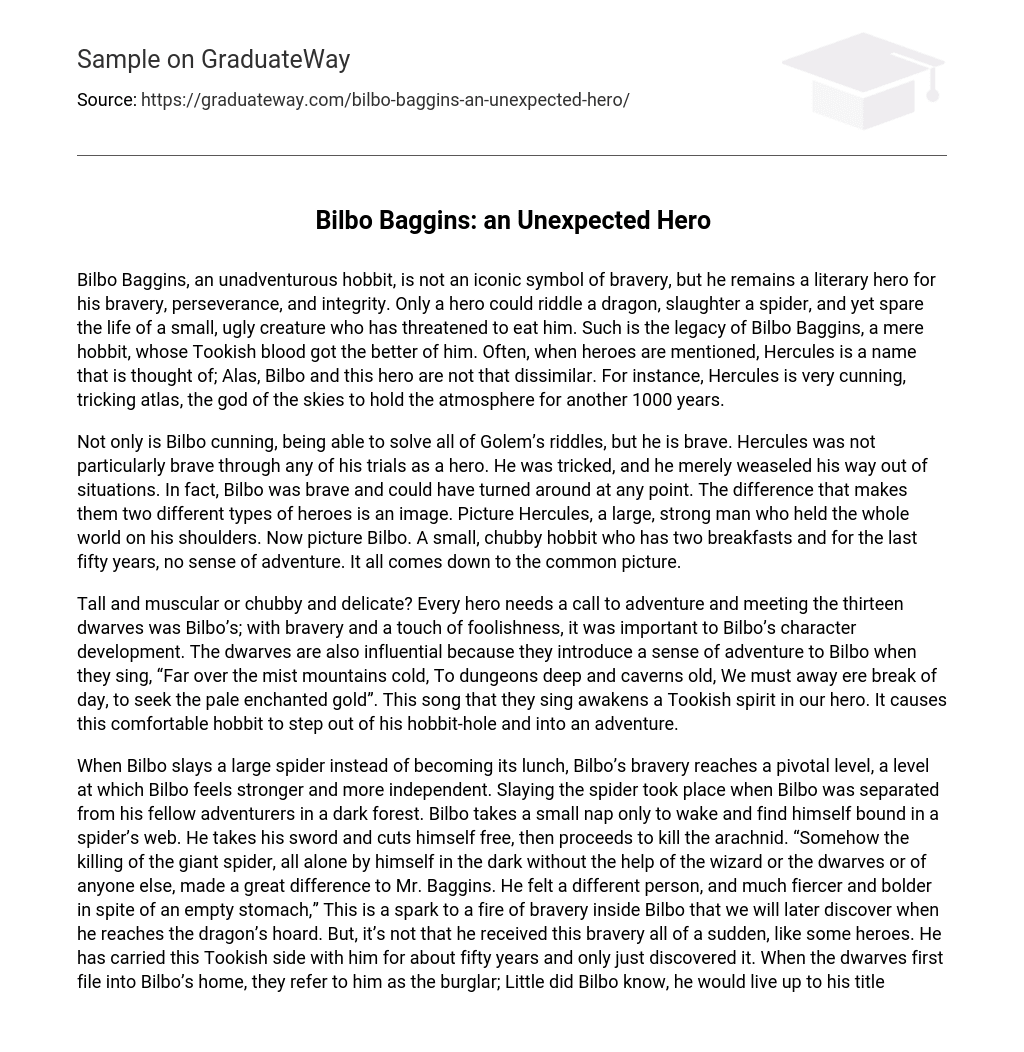Bilbo Baggins, an unadventurous hobbit, is not an iconic symbol of bravery, but he remains a literary hero for his bravery, perseverance, and integrity. Only a hero could riddle a dragon, slaughter a spider, and yet spare the life of a small, ugly creature who has threatened to eat him. Such is the legacy of Bilbo Baggins, a mere hobbit, whose Tookish blood got the better of him. Often, when heroes are mentioned, Hercules is a name that is thought of; Alas, Bilbo and this hero are not that dissimilar. For instance, Hercules is very cunning, tricking atlas, the god of the skies to hold the atmosphere for another 1000 years.
Not only is Bilbo cunning, being able to solve all of Golem’s riddles, but he is brave. Hercules was not particularly brave through any of his trials as a hero. He was tricked, and he merely weaseled his way out of situations. In fact, Bilbo was brave and could have turned around at any point. The difference that makes them two different types of heroes is an image. Picture Hercules, a large, strong man who held the whole world on his shoulders. Now picture Bilbo. A small, chubby hobbit who has two breakfasts and for the last fifty years, no sense of adventure. It all comes down to the common picture.
Tall and muscular or chubby and delicate? Every hero needs a call to adventure and meeting the thirteen dwarves was Bilbo’s; with bravery and a touch of foolishness, it was important to Bilbo’s character development. The dwarves are also influential because they introduce a sense of adventure to Bilbo when they sing, “Far over the mist mountains cold, To dungeons deep and caverns old, We must away ere break of day, to seek the pale enchanted gold”. This song that they sing awakens a Tookish spirit in our hero. It causes this comfortable hobbit to step out of his hobbit-hole and into an adventure.
When Bilbo slays a large spider instead of becoming its lunch, Bilbo’s bravery reaches a pivotal level, a level at which Bilbo feels stronger and more independent. Slaying the spider took place when Bilbo was separated from his fellow adventurers in a dark forest. Bilbo takes a small nap only to wake and find himself bound in a spider’s web. He takes his sword and cuts himself free, then proceeds to kill the arachnid. “Somehow the killing of the giant spider, all alone by himself in the dark without the help of the wizard or the dwarves or of anyone else, made a great difference to Mr. Baggins. He felt a different person, and much fiercer and bolder in spite of an empty stomach,” This is a spark to a fire of bravery inside Bilbo that we will later discover when he reaches the dragon’s hoard. But, it’s not that he received this bravery all of a sudden, like some heroes. He has carried this Tookish side with him for about fifty years and only just discovered it. When the dwarves first file into Bilbo’s home, they refer to him as the burglar; Little did Bilbo know, he would live up to his title. It starts with Bilbo’s first encounter with danger, the Trolls.
When sneaking into the Troll cave, Bilbo is tempted into one troll’s pocket, “Then Bilbo plucked up the courage and put his little hand into William’s enormous pocket”. This is the first instance when Bilbo puts on the persona of “The Burglar”. Yet this is to impress the dwarves. Even later, when meeting golem, he steals the invisibility ring. However, this time he had no one to impress. Of course, he does show off his prize to his companions, but it was not what influenced his actions. Finally, when searching through the dragon’s hoard, Bilbo pockets the Arkenstone.
He does this to prevent a possible war, even though he risks his friendship with the dwarves. At this point, his dishonesty is not influenced by his friends at all. In theory, Bilbo has become both the “Burglar” and a hero. Frequently, Heroes are thought of for seeking and killing those who do wrong, but feeling pity for those same people and sparing their lives is the hard option. This is exactly what Bilbo does for Golem, a slimy, underground-dwelling creature that threatens to kill Bilbo for intruding on his home. Golem and Bilbo battle it out with riddles, and Bilbo finally stumps him as to what is in his pocket.
Golem still pursues him when he realizes Bilbo had obtained his “birthday present”. But, Bilbo slips on the ring and manages to evade him. Although killing the creature was tempting, Bilbo feels, “A sudden understanding, a pity mixed with horror, welled up in Bilbo’s heart”. He realizes it’s not a fair fight. The difference between Bilbo and a hero who kills without a second thought is that Bilbo has enough feeling in his heart to know when it’s not worth it. Not only is Bilbo kind, but he has the perseverance to be envied. Facing a nearly invincible dragon is not the easiest job in the world, and Bilbo was the one who was hired.
Not only was it difficult, but it was also what Bilbo feared most. (I need a good quote to put here. This has to be filled and the importance needs to be added). Heros are not always tall, blonde, and muscular. Sometimes they can be found deep in a hole eating their second or third breakfast. It’s how they become heroes. As Peter S. Beagle said once, “Heroes know that things must happen when it is time for them to happen. A quest may not simply be abandoned; unicorns may go unrescued for a long time, but not forever; a happy ending cannot come in the middle of the story”.





